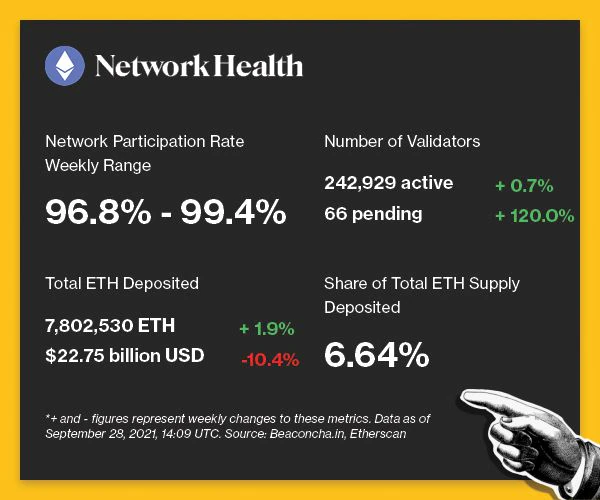This article originally appeared in Valid Points, CoinDesk’s weekly newsletter breaking down Ethereum 2.0 and its sweeping impact on crypto markets. Subscribe to Valid Points here.
“You’re only as strong as your weakest link.” This adage is especially true when it comes to decentralization and even more important when you are potentially building a new base layer for the world economy.
Over the past several years, Ethereum has developed a strong track record for security while maintaining permissionless access to its platform and the applications built on top. As the network merges to Proof-of-Stake, it’s vital the network continues to mitigate any possible point of failure.
According to CypherPunks, “an Ethereum client is a software application that implements the Ethereum specification and communicates over the peer-to-peer network with other Ethereum clients.” Each node runs a client to host their implementation of the network and verify an accurate history of blocks and their transactions. The two most popular clients on Ethereum’s proof of work chain are Geth and Parity. We recently saw a Geth bug affecting over 54% of nodes, reaching high severity and causing those nodes to split from the network.
Ethereum’s developer teams and community have recently discussed the need for further client diversity on the Beacon Chain as Prysm accounts for nearly two-thirds of the current composition. Developers have made it clear that Prysm itself is not the issue, rather it is the high degree of concentrated composition among nodes running the single client. Developers are, therefore, advocating for validators to switch to minority clients to reach a distributed balance across the chain.
Any large client bug can create quite the headache for Ethereum stakeholders, but the bug is amplified if a large portion of the nodes are all experiencing the same issue, potentially tricking the chain into believing their bugged chain is correct. An issue like this happening with two-thirds of nodes could lead to a chain split, creating larger security risk for users and developers, slashing issues for validators and potentially needing a bailout from the overall network, which is inherently not a very decentralized solution.
While Prysm is not inherently more risky than other clients, punishments for a client bug on a majority client will be amplified and could lead to pretty significant validator penalties. Validator downtime is further punished during large outages, making majority client bugs a larger issue for individual stakers as well. Therefore, running a minority client will reduce slashing risk and it will become more important for the wider network as we move closer to the Merge, when the current network is transitioned into the Beacon Chain.
Welcome to another edition of Valid Points.
Pulse check
The following is an overview of network activity on the Ethereum 2.0 Beacon Chain over the past week. For more information about the metrics featured in this section, check out our 101 explainer on Eth 2.0 metrics.

Disclaimer: All profits made from CoinDesk’s Eth 2.0 staking venture will be donated to a charity of the company’s choosing once transfers are enabled on the network.
Validated takes
- The dYdX community reconfirmed that its token’s utility is strictly governance and will not be used as a means to redistribute revenue. BACKGROUND: Equity and token owners seem to be at odds because the equity investors associated with dYdX have all future rights to profitability and growth. The move may be part of a deal with early investors or a strategic play to avoid further regulation.
- The founder of Yearn, Andre Cronje, released an open-source alternative to OpenSea in a move to disrupt the non-fungible token (NFT) trading markets. BACKGROUND: OpenSea is the largest NFT market by trading volume and takes a 2.5% fee from every sale on its platform. The crypto community believes OpenSea’s lack of a token, high fees and insider trading allegations makes the space ripe for innovation. Cronje released the code but does not plan on launching or operating the market himself.
- A Bitfinex-controlled wallet accidentally spent $23.7 million in gas fees during a transfer of $100,000 in USDT. BACKGROUND: The transfer was done by DiversiFi, a Bitfinex sister company that allows its users to access decentralized finance (DeFi) without spending gas fees. DiversiFi noted that no consumer funds were at risk and the miner had sent back a majority of the funds later in the day.
- SparkPool, the second-largest Ethereum mining pool, is suspending its services at the end of the month. BACKGROUND: China’s crackdown on crypto initially resulted in SparkPool’s decision to ban Chinese users, but after recent regulatory updates the pool has decided to shut down to users worldwide. The mining pool contributes nearly 22% of Ethereum’s processing power, or hashrate, and will continue to have wider effects on the network.
- Fireblock’s head of business development, Rob Salman, proposed to make Fireblocks the first whitelisted institution on Aave Arc. BACKGROUND: Aave Arc will be a decentralized lending platform with whitelisting capabilities in order to onboard institutional clients and retain regulatory compliance. As a financial services provider, Fireblocks would aid in whitelisting other compliant institutions and bringing additional capital and services to decentralized finance.
Factoid of the week

Open comms
Valid Points incorporates information and data about CoinDesk’s own Eth 2.0 validator in weekly analysis. All profits made from this staking venture will be donated to a charity of our choosing once transfers are enabled on the network. For a full overview of the project, check out our announcement post.
You can verify the activity of the CoinDesk Eth 2.0 validator in real time through our public validator key, which is:
0xad7fef3b2350d220de3ae360c70d7f488926b6117e5f785a8995487c46d323ddad0f574fdcc50eeefec34ed9d2039ecb.
Search for it on any Eth 2.0 block explorer site.














